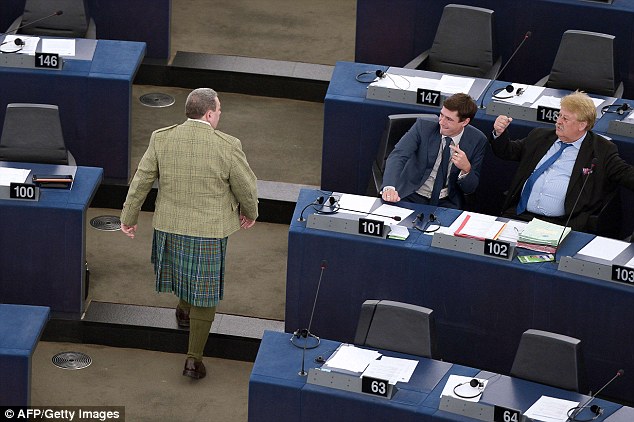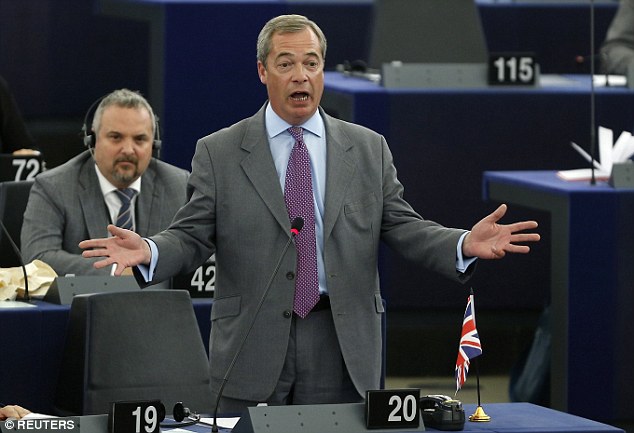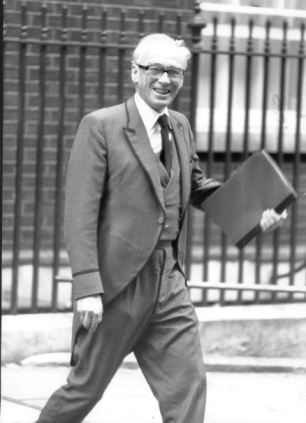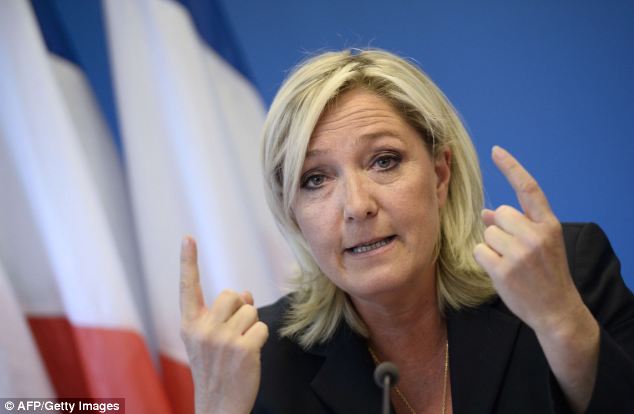Is this another sign that Britain is moving towards the exit of the hated anti-democracy EU which, yet again, is completely and utterly ignoring the public?
As usual, it seems to be only the British protesting about the EU's casual disregard for election results.
Britain's 24 new UKIP MEPs, elected in the recent EU elections which UKIP won in the UK, yesterday heroically turned their backs on the EU anthem - Beethoven's "Ode to Joy" - in a pro-democracy protest as the EU Parliament was opened in Strasbourg. And Britain's 19 newly-elected Tory MEPs refused to stand during the anthem.
The British nationalist, anti-EU party's public show of dissent came after the German socialist Martin Schulz was reappointed president of the European Parliament - in a shady 'backroom stitch up' sparking anger in Britain.
Mr Schulz was backed by MEPs to carry on in the £213,000 a year role, despite the fact that his Socialist group LOST May's European elections.
The Left-wing MEP, who has also attacked tax havens, will pocket £124,000 of his cash in special allowances without paying any taxation at all.
In a show of complete contempt for democracy, Mr Schulz was elected by MEPs in Strasbourg yesterday after they observed the European anthem.
Although most MEPs stood up for it, British Tory MEPs sat quietly while UKIP MEPs turned their backs on the orchestra and the EU flag.
Steven Woolfe, UKIP's Economics Spokesman and one of the North West of England's three UKIP MEPs, said the show of protest was against the 'done deal' for Mr Schulz's election as president of the EU parliament.
He said: 'Only the Labour group in the EU and their Socialist partners clapping Shultz in his speech for EU Parliament president.'
UKIP deputy leader Paul Nuttall, another MEP for the North West of England, added: 'We don't recognise or respect the EU flag or anthem. They are both symbols of our servitude inside a political union which the British people reject.
'We will do everything we can in European Parliament to oppose the Federalist system which ignores our national democracy and pushes millions of people across Europe into poverty and unemployment. We stand up for our people, not the EU flag and anthem.'
Labour's lickspittle stance towards the EU and its complete disregard for democracy comes as no surprise, since they're the party who, when they were in power under Blair, gave away part of Britain's EU rebate which Mrs Thatcher so heroically managed to win for us.
For part of the year the EU Parliament has to up sticks from Belgian capital Brussels to Strasbourg in eastern France, at great cost to the EU taxpayer, for no other reason other than to suit French egos.
Farage turns his back on 'European anthem' after Brussels 'stitch up' sees German socialist appointed MEP president
UKIP leader joined his party's MEPs turning their backs as anthem played
Party said they did not 'recognise or respect the EU flag or anthem'
Comes after Martin Schulz chosen by MEPs to carry on as Parliament chief
The vote was taken in secret today sparking accusations of EU 'carve up'
Socialist MEP wants more power for Brussels over national Parliaments
Schulz backed by supporters of Jean-Claude Juncker in 'backroom' deal
By Tom Mctague, Mail Online Deputy Political Editor
1 July 2014
Daily Mail

UKIP leader Nigel Farage and Britain's 23 other UKIP MEPs turned their backs in protest in the EU Parliament in Strasbourg yesterday after the German socialist Martin Schulz was reappointed president of the European Parliament despite the fact that his Socialist group LOST May's European elections. For part of the year the EU Parliament has to up sticks from Belgian capital Brussels to Strasbourg in eastern France, at great cost to the EU taxpayer, for no other reason other than to suit French egos
Nigel Farage was today accused of 'shocking disrespect' after turning his back on the EU's national anthem as the European Parliament was opened in France.
The UKIP leader's public show of dissent came after the German socialist Martin Schulz was reappointed president of the European Parliament - in a shady 'backroom stitch up' sparking anger in Britain.
Mr Schulz was backed by MEPs to carry on in the £213,000 a year role, despite the fact that his Socialist group lost May's European elections.

Heroes: Nigel Farage and other UKIP MEPs turned their backs as an orchestra performed the European anthem in the European parliament in Strasbourg

Mr Farage dismissed the election of European Parliament president Martin Schulz as a 'stitch up'

Scotland's newly-elected UKIP MEP David Coburn, wearing a kilt, climbs stairs as he attends the opening session of the European Parliament yesterday
Mr Schulz was elected by MEPs in Strasbourg yesterday after they observed the European anthem.
Although most MEPs stood up for it, British Tory MEPs sat quietly while UKIP MEPs turned their backs on the orchestra and the EU flag.
Steven Woolfe said the show of protest was against the 'done deal' for Mr Schulz's election as president of the EU parliament.
He said: 'Only the Labour group in the EU and their Socialist partners clapping Shultz in his speech for EU Parliament president.'

Steven Woolfe, UKIP's Economics Spokesman and one of the North West of England's three UKIP MEPs, said the show of protest was against the 'done deal' for Mr Schulz's election as president of the EU parliament.
UKIP deputy leader Paul Nuttall MEP added: 'We don't recognise or respect the EU flag or anthem. They are both symbols of our servitude inside a political union which the British people reject.
'We will do everything we can in European Parliament to oppose the Federalist system which ignores our national democracy and pushes millions of people across Europe into poverty and unemployment. We stand up for our people, not the EU flag and anthem.'
But Liberal Democrat MEP Catherine Bearder criticised the UKIP MEPs for their 'shocking disrespect' during the opening ceremony, describing their actions as "rude'.
MEPs from Parliament's three main pro-EU groups agreed to keep Mr Schulz in place after he backed his rival Jean-Claude Juncker to become president of the European Commission last week.
In his role Mr Schulz - who has campaigned against budget cuts across Europe - will take home a pay and perks package worth over £213,000 a year.


Martin Schulz (left) has been chosen to be the European Parliament's president for another term, risking further anger from the British Prime Minister

Former Luxembourg Prime Minister Jean Claude Juncker was backed to become European Commission president by German Chancellor Angela Merkel
EUROPE'S NATIONAL ANTHEM
The EU's 'national anthem' comes from Beethoven's 'Ode to Joy'
In 1985 European leaders adopted the tune as its official anthem.
According to the EU the anthem 'expresses the European ideals of freedom, peace and solidarity'.
But the EU insists: 'The European anthem is not intended to replace the national anthems of the EU countries but rather to celebrate the values they share.'
The Left-wing MEP, who has also attacked tax havens, will pocket £124,000 of his cash in special allowances without paying any taxation at all.
He won yesterday's vote by 409 to 314 - despite refusuing to turn up for a debate between different candidates, including British Tory MEP Sajjad Karim on Monday night.
Mr Schulz was the spitzenkandidat - or leading candidate - for the Socialists to become the European Commission. But he lost out in the race for Brussels' top job to Mr Juncker who was backed by EU leaders on Friday.
Mr Farage said: 'There are no losers among the EU elite after this election. Everyone is a winner.
'This is a big stitch up. For them, it's damn all to do with democracy and it's all about the carving up of power among the EU elites.'
Pawel Swidlicki, of the British think tank Open Europe, added: 'The re-election of Schulz via a secret ballot following a backroom stitch-up between the main centre-right and centre-left blocks epitomises the EU's democratic flaws and exposes the hollow nature of the arguments in favour of spitzenkandidaten.
'Schulz is an aggressive proponent of increasing the power of the European Parliament and so will be a big obstacle to EU reform.'
Mr Schulz has been the president, or speaker of the EU assembly, since January 2012. His reelection makes him the first MEP in the parliament's history to serve two consecutive terms.
As president of the assembly, the German MEP will become one of the most well paid parliamentarians in the world.

Brussels' three unelected presidents - Herman Van Rompuy, left, Jose Manuel Barroso, centre, and Martin Schulz, right, accepted the Nobel Peace prize on behalf of the EU in 2012. Mr Van Rompuy (dubbed "Rumpy Pumpy" by the British) is the president of the European Council, representing EU leaders. Mr Barroso is the president of the Commission - Brussels' governing bureaucracy - until he is replaced by Jean-Claude Juncker. And Mr Schulz is the president of the European Parliament - representing MEPs
According to the Telegraph he will receive over half of his income in special presidential tax free allowances - with annual 'subsistence' payments worth £89,000 and a 'residence' allowance worth over £35,000.
He will also receive an extra 'representation allowance' worth £14,000 a year as well as having two limousines, BMW 7s with drivers for his personal use.
The rest of the EU's plumb jobs will be agreed in a fortnight - with the president of the European Council of EU leaders and the new EU foreign policy chief up for grabs.
The Danish PM Helle Thorning-Schmidt, Dutch leader Mark Rutte and Andrus Ansip, the former Estonian leader, are in the running to replace Herman Van Rompuy as EU Council president.
Federica Mogherini, the Italian foreign minister, meanwhile is the favourite to replace Baroness Ashton as EU foreign minister.
As usual, it seems to be only the British protesting about the EU's casual disregard for election results.
Britain's 24 new UKIP MEPs, elected in the recent EU elections which UKIP won in the UK, yesterday heroically turned their backs on the EU anthem - Beethoven's "Ode to Joy" - in a pro-democracy protest as the EU Parliament was opened in Strasbourg. And Britain's 19 newly-elected Tory MEPs refused to stand during the anthem.
The British nationalist, anti-EU party's public show of dissent came after the German socialist Martin Schulz was reappointed president of the European Parliament - in a shady 'backroom stitch up' sparking anger in Britain.
Mr Schulz was backed by MEPs to carry on in the £213,000 a year role, despite the fact that his Socialist group LOST May's European elections.
The Left-wing MEP, who has also attacked tax havens, will pocket £124,000 of his cash in special allowances without paying any taxation at all.
In a show of complete contempt for democracy, Mr Schulz was elected by MEPs in Strasbourg yesterday after they observed the European anthem.
Although most MEPs stood up for it, British Tory MEPs sat quietly while UKIP MEPs turned their backs on the orchestra and the EU flag.
Steven Woolfe, UKIP's Economics Spokesman and one of the North West of England's three UKIP MEPs, said the show of protest was against the 'done deal' for Mr Schulz's election as president of the EU parliament.
He said: 'Only the Labour group in the EU and their Socialist partners clapping Shultz in his speech for EU Parliament president.'
UKIP deputy leader Paul Nuttall, another MEP for the North West of England, added: 'We don't recognise or respect the EU flag or anthem. They are both symbols of our servitude inside a political union which the British people reject.
'We will do everything we can in European Parliament to oppose the Federalist system which ignores our national democracy and pushes millions of people across Europe into poverty and unemployment. We stand up for our people, not the EU flag and anthem.'
Labour's lickspittle stance towards the EU and its complete disregard for democracy comes as no surprise, since they're the party who, when they were in power under Blair, gave away part of Britain's EU rebate which Mrs Thatcher so heroically managed to win for us.
For part of the year the EU Parliament has to up sticks from Belgian capital Brussels to Strasbourg in eastern France, at great cost to the EU taxpayer, for no other reason other than to suit French egos.
Farage turns his back on 'European anthem' after Brussels 'stitch up' sees German socialist appointed MEP president
UKIP leader joined his party's MEPs turning their backs as anthem played
Party said they did not 'recognise or respect the EU flag or anthem'
Comes after Martin Schulz chosen by MEPs to carry on as Parliament chief
The vote was taken in secret today sparking accusations of EU 'carve up'
Socialist MEP wants more power for Brussels over national Parliaments
Schulz backed by supporters of Jean-Claude Juncker in 'backroom' deal
By Tom Mctague, Mail Online Deputy Political Editor
1 July 2014
Daily Mail

UKIP leader Nigel Farage and Britain's 23 other UKIP MEPs turned their backs in protest in the EU Parliament in Strasbourg yesterday after the German socialist Martin Schulz was reappointed president of the European Parliament despite the fact that his Socialist group LOST May's European elections. For part of the year the EU Parliament has to up sticks from Belgian capital Brussels to Strasbourg in eastern France, at great cost to the EU taxpayer, for no other reason other than to suit French egos
Nigel Farage was today accused of 'shocking disrespect' after turning his back on the EU's national anthem as the European Parliament was opened in France.
The UKIP leader's public show of dissent came after the German socialist Martin Schulz was reappointed president of the European Parliament - in a shady 'backroom stitch up' sparking anger in Britain.
Mr Schulz was backed by MEPs to carry on in the £213,000 a year role, despite the fact that his Socialist group lost May's European elections.

Heroes: Nigel Farage and other UKIP MEPs turned their backs as an orchestra performed the European anthem in the European parliament in Strasbourg

Mr Farage dismissed the election of European Parliament president Martin Schulz as a 'stitch up'

Scotland's newly-elected UKIP MEP David Coburn, wearing a kilt, climbs stairs as he attends the opening session of the European Parliament yesterday
Mr Schulz was elected by MEPs in Strasbourg yesterday after they observed the European anthem.
Although most MEPs stood up for it, British Tory MEPs sat quietly while UKIP MEPs turned their backs on the orchestra and the EU flag.
Steven Woolfe said the show of protest was against the 'done deal' for Mr Schulz's election as president of the EU parliament.
He said: 'Only the Labour group in the EU and their Socialist partners clapping Shultz in his speech for EU Parliament president.'

Steven Woolfe, UKIP's Economics Spokesman and one of the North West of England's three UKIP MEPs, said the show of protest was against the 'done deal' for Mr Schulz's election as president of the EU parliament.
UKIP deputy leader Paul Nuttall MEP added: 'We don't recognise or respect the EU flag or anthem. They are both symbols of our servitude inside a political union which the British people reject.
'We will do everything we can in European Parliament to oppose the Federalist system which ignores our national democracy and pushes millions of people across Europe into poverty and unemployment. We stand up for our people, not the EU flag and anthem.'
But Liberal Democrat MEP Catherine Bearder criticised the UKIP MEPs for their 'shocking disrespect' during the opening ceremony, describing their actions as "rude'.
MEPs from Parliament's three main pro-EU groups agreed to keep Mr Schulz in place after he backed his rival Jean-Claude Juncker to become president of the European Commission last week.
In his role Mr Schulz - who has campaigned against budget cuts across Europe - will take home a pay and perks package worth over £213,000 a year.

Martin Schulz (left) has been chosen to be the European Parliament's president for another term, risking further anger from the British Prime Minister

Former Luxembourg Prime Minister Jean Claude Juncker was backed to become European Commission president by German Chancellor Angela Merkel
EUROPE'S NATIONAL ANTHEM
The EU's 'national anthem' comes from Beethoven's 'Ode to Joy'
In 1985 European leaders adopted the tune as its official anthem.
According to the EU the anthem 'expresses the European ideals of freedom, peace and solidarity'.
But the EU insists: 'The European anthem is not intended to replace the national anthems of the EU countries but rather to celebrate the values they share.'
The Left-wing MEP, who has also attacked tax havens, will pocket £124,000 of his cash in special allowances without paying any taxation at all.
He won yesterday's vote by 409 to 314 - despite refusuing to turn up for a debate between different candidates, including British Tory MEP Sajjad Karim on Monday night.
Mr Schulz was the spitzenkandidat - or leading candidate - for the Socialists to become the European Commission. But he lost out in the race for Brussels' top job to Mr Juncker who was backed by EU leaders on Friday.
Mr Farage said: 'There are no losers among the EU elite after this election. Everyone is a winner.
'This is a big stitch up. For them, it's damn all to do with democracy and it's all about the carving up of power among the EU elites.'
Pawel Swidlicki, of the British think tank Open Europe, added: 'The re-election of Schulz via a secret ballot following a backroom stitch-up between the main centre-right and centre-left blocks epitomises the EU's democratic flaws and exposes the hollow nature of the arguments in favour of spitzenkandidaten.
'Schulz is an aggressive proponent of increasing the power of the European Parliament and so will be a big obstacle to EU reform.'
Mr Schulz has been the president, or speaker of the EU assembly, since January 2012. His reelection makes him the first MEP in the parliament's history to serve two consecutive terms.
As president of the assembly, the German MEP will become one of the most well paid parliamentarians in the world.

Brussels' three unelected presidents - Herman Van Rompuy, left, Jose Manuel Barroso, centre, and Martin Schulz, right, accepted the Nobel Peace prize on behalf of the EU in 2012. Mr Van Rompuy (dubbed "Rumpy Pumpy" by the British) is the president of the European Council, representing EU leaders. Mr Barroso is the president of the Commission - Brussels' governing bureaucracy - until he is replaced by Jean-Claude Juncker. And Mr Schulz is the president of the European Parliament - representing MEPs
According to the Telegraph he will receive over half of his income in special presidential tax free allowances - with annual 'subsistence' payments worth £89,000 and a 'residence' allowance worth over £35,000.
He will also receive an extra 'representation allowance' worth £14,000 a year as well as having two limousines, BMW 7s with drivers for his personal use.
The rest of the EU's plumb jobs will be agreed in a fortnight - with the president of the European Council of EU leaders and the new EU foreign policy chief up for grabs.
The Danish PM Helle Thorning-Schmidt, Dutch leader Mark Rutte and Andrus Ansip, the former Estonian leader, are in the running to replace Herman Van Rompuy as EU Council president.
Federica Mogherini, the Italian foreign minister, meanwhile is the favourite to replace Baroness Ashton as EU foreign minister.
Last edited:


















